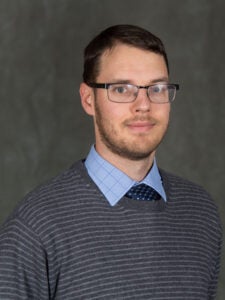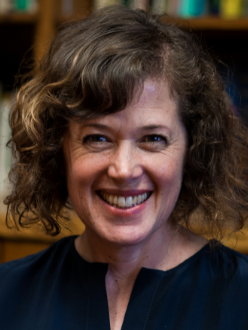Three College Professors Receive Dean’s Excellence in Teaching Awards, Honored for Dedication to Educating Students
Patrick Johnson (Department of Physics), Chandra Manning (Department of History) and Libbie Rifkin (Department of English) will receive the prestigious Dean’s Excellence in Teaching Award. This award is given to those faculty members who have demonstrated that they are exceptional educators who are deeply committed to enriching the undergraduate experience.
“The innovation, dedication and commitment of these teachers contribute significantly to advancing the mission of Georgetown College,” says Soyica Colbert, interim dean.
Patrick Johnson

Johnson is a physicist at the university whose research interests include modeling micromagnetics and calculations of classical and quantum systems. However, the professor’s greatest passion is creating an environment where complex topics like physics are accessible to all.
Since starting at Georgetown in 2014, Johnson has adapted the introductory course Principles of Physics so that each of the 170 students who come to his class from varied backgrounds and interests leaves with a better understanding of the material. He recently developed virtual reality tools to help convey abstract concepts like vector fields through 3D visualization.
Johnson also makes sure to learn all of his students’ names within the first few weeks of school so that when students meet with him for office hours, he can better assist them as individuals.
With the help of the Doyle Fellowship, Johnson was also able to develop his course Physics of Sight and Sound. In this class, students explore the course content and issues of diversity and difference, such as how our biases affect our understanding. Next semester, Johnson will begin co-teaching a course for incarcerated students through the Prison and Justice Initiative.
One of his greatest contributions in increasing accessibility to science has been the publication of his book The Physics of Star Wars, which explores complex scientific topics through the popular movie franchise.
Amy Liu, professor of physics and department chair, says that Johnson “has developed a talent and passion for communicating science to ever broader audiences.”
“Patrick has established himself as a gifted and innovative teacher who cares deeply about his students,” she continues. “Patrick has made many contributions to our shared mission of encouraging intellectual exploration, cultivating lifelong learning and educating the whole person. He is an exceptional teacher and a delightful colleague.”
Johnson says that he looks forward to continuing to find new ways to educate others about science and hopes to bring even more focus to social justice in his classes.
“I love teaching physics, says Johnson. “When Georgetown hired me six years ago, I felt like I had gotten my dream job. I still feel that way.”
Chandra Manning

Manning is one of the leading historians of the Civil War and Reconstruction era of her generation. As a long-time member of the history department, Manning has created a unique environment whereby students feel challenged, respected and engaged.
In her courses like Baseball and American Society from 1840s-1950s, Manning entices students into the subject matter with an engaging topic and uses that to explain deeper undercurrents in United States history. She has led undergraduates in collaborations with the National Parks Service and the Organization of American Historians.
The professor also created the HIST099 course curriculum, which is now a requirement for all students in the College of Arts and Sciences to take as a graduation requirement.
Most importantly, Manning took time to adapt her courses to the needs of her students as the university switched to a virtual learning environment.
“This meant creating space for undergraduates and graduates to honestly examine where they really found themselves and where we as a society found ourselves, with the courage to admit ways in which lived experience fell short of carefully-curated images of success,” says Manning. It meant looking loss squarely in the face rather than cheerily pretending it was not there. And then it meant beginning from that shared experience of loss to consider loss and crisis as elements of human experience that we shared with other humans in the past.”
Bryan McCann, chair of the history department, says that he has “never seen a more compassionate teacher who brings both a scholarly and a deeply empathetic understanding of neurodiversity to the classroom.”
“Chandra understands why neuro-diverse students are often disadvantaged by traditional assessments, and takes care to recognize the individual approaches of her students, even in large-enrollment courses,” he says. “She is a model teacher in every regard, and is richly deserving of the Dean’s Teaching Award.”
Libbie Rifkin

Rifkin is a professor in the English department and founding director of the Program in Disability Studies at Georgetown. She began serving as special advisor for disability to the vice president of diversity, equity and inclusion this past fall. Rifkin’s approach to her teaching and research spans a variety of fields including African American poetry, modernism, feminist theory and disability studies.
The professor’s thorough and interdisciplinary approach asks her students to demand accountability, care and mutuality in their work. Notably, Rifkin holds herself to these same standards, deftly balancing pedagogy and personal growth by listening to and learning from her students.
When the COVID-19 pandemic hit, Rifkin noted that engagement in her online class had dropped. She asked her class to engage in an open discussion about their feelings around this new environment and, after hearing their thoughts, decided to adapt her syllabus to reflect the time. She changed their readings from Gertrude Stein to Audre Lorde’s cancer journals and the literature from the HIV/AIDS epidemic and immediately noticed a difference.
Rifkin says that this re-emphasized the importance of her role as a professor.
“Classroom teaching is at the heart of my work,” Rifkin says. “Now more than ever, we see that a pedagogy of care can be vitalizing, in ways that extend far beyond the classroom. I’m grateful for the chance to discover this, each time anew, with my students.”
Jennifer Natalya Fink, director of the Disability Studies Program, says that Rifkin’s commitment to individual, institutional and broader cultural transformation and the design of her courses as well as their content reflects her teaching ethic.
“Most striking is how she engages students’ own experiences and thoughts, leaving room to change and challenge her own ideas and practices at any moment,” she continues. “Rifkin embodies cura personalis more than any other individual I have encountered. She enacts and instructs care for the whole person at every turn, while interrogating the politics and poetics of that very care.”
-by Shelby Roller (G’19)
